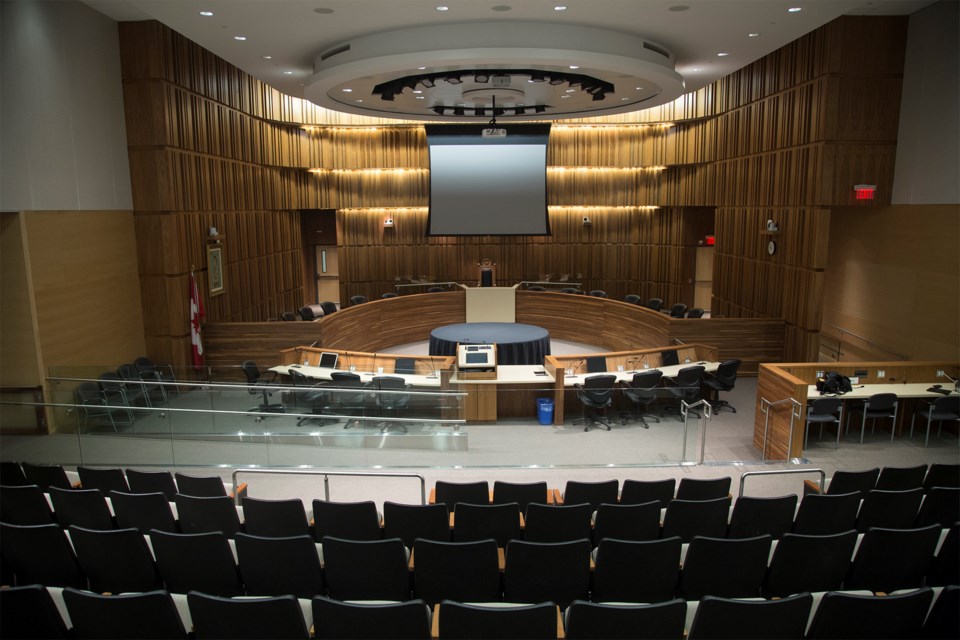Ward 3 Councillor June Hofland raised an interesting point at Monday’s Committee of the Whole when she asked that there needs to be more of an attempt made to put graphics and images related to council questions in staff reports on the overhead screen.
It seems like a reasonable request. It seems like something that council and staff should have been doing all along with these meetings. But the fact that it doesn’t happen already speaks to one of the biggest problems with local governance.
Council meetings are not user friendly.
As an observer, I think there are times that the people leading these meetings forget that they’re supposed to be for the benefit of the constituents. That seems weird to say because the occasional speechifying seems very much like it’s meant to play to an audience, and there were some examples of that on display at Monday’s meeting.
But underneath that jockeying though is the core purpose of the debate itself, to give direction for staff to follow in pursuit of an objective decided by the majority.
So much of this process already happens away from the public. Much of the staff work that goes into the various reports and directives brought to council are done in city hall offices and conference rooms, and yes, there is often a public feedback portion or some kind of town hall, but that’s part of a broader process that’s directed, and largely governed, by senior staff.
Now councillors play a part in that process too, often engaging with staff on behalf of their own interest, or the interest of constituents, but if this is not the case, council also gets a chance to engage with staff directly when a report is delivered in advance of a council meeting.
In other words, when an issue comes before council for discussion, almost everyone involved is probably well-versed in the material. Except, in many cases, the general public.
The batting back-and-forth of acronyms, precedents, and various federal, provincial and municipal statutes is tough enough to keep up with. And sure, you can do the homework, and read the council report published in the meeting agenda, but even I have a tough time wrapping my head around those details sometimes.
Laying aside that this would undoubtedly be more work for the clerk's office, let’s propose an idea that will help break down the details of a council report in layman’s terms. What if we treated a council report like a grade school science fair project?
For instance, let’s consider the update of the Community Energy Initiative.
You start with the problem, which is what can the City of Guelph due to mitigate our contribution to the effects of climate change?
Then you formulate a hypothesis: we, the staff of the City of Guelph, believe that moving to net zero build and moving to 100 per cent renewable energy by 2050 will have the desire effect of ceasing the damage the corporation is doing to the planet by decreasing our carbon footprint.
Now you lay out the reasons why that is, the background research, the sources, who you talked to, and why you reached this proposal.
Finally, lay out the procedure by which you will reach your goal. Point-by-point, and step-by-step, with clear goals and deadlines about what is hoped to be accomplished and by what time.
Okay, so that’s not exactly the scientific method, but I’m not exactly a scientist. Unless mixology counts, and it probably doesn’t.
The point is that I feel like one should be able to pick up a staff report and read it with the same relative ease one would have if they were to pick up an article or a novel. I mean, you shouldn’t need to be an expert in 17th century French history to be able to enjoy the adventures of the Three Musketeers, right?
The present reports are good, you can read them and get the big picture to be sure, but I think the broader community needs a way to get into it. A place to begin.
Another place to begin would be to make the council experience itself more inviting.
There are times at council, when people come out for a particular presentation or item on the agenda and then leave once that business is concluded. Mayor Cam Guthrie sometimes makes the joke that they’re more than welcome to stay, but it’s okay if they don’t.
Few, if any, ever take him up on the offer.
The punchline is obvious, our city council meetings are boring, and attendance is begrudgingly undertaken when the issue is in your wheelhouse, but suppose we took these times as opportunities not just to hear from people, but to make them more actively involved in all issues, even just as an observer.
People are always eager to jump on city council for a decision, but how much do they know about the process, how much do they want to know, and what can we all do to change that?
